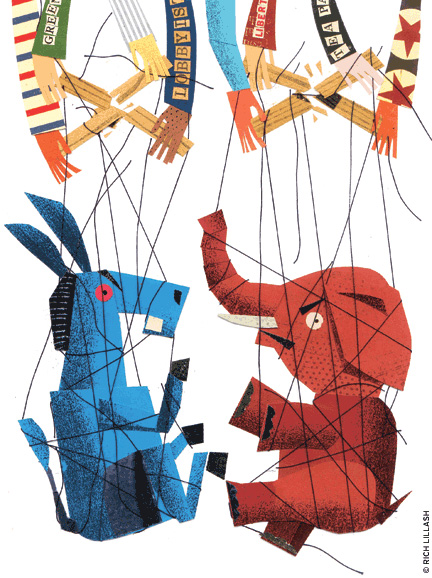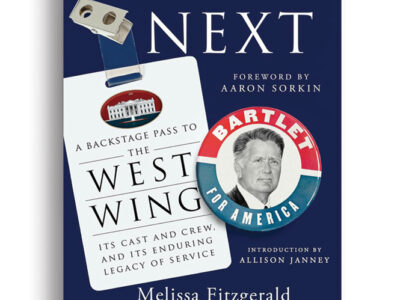
“I’d like to start with two sobering facts about America in the early 21st Century,” Penn President Amy Gutmann said at the beginning of this year’s David and Lyn Silfen University Forum. “One is that we’re stuck in partisan gridlock, and the other is that China and other countries are outpacing us in economic development.”
Those facts set the stage for “Is America Broken? A Conversation on the 2012 Elections and Beyond,” which took place in Irvine Auditorium this past March. In addition to Gutmann, who served as moderator, the panelists were: Alan Simpson, former US Senator from Wyoming and co-chair, with Erskine Bowles, of the National Commission on Fiscal Responsibility and Reform; Ed Rendell C’65 Hon’00, former governor of Pennsylvania, former mayor of Philadelphia, and lecturer in urban studies at Penn; Peggy Noonan, a Wall Street Journal columnist, former assistant to President Ronald Reagan, and former speechwriter for President George H. W. Bush; Charles Blow, the visual op-ed columnist for The New York Times; and John Lapinski, associate professor of political science at Penn and an analyst for NBC News’ elections unit. (You can watch the forum in its entirety here: www.upenn.edu/silfenforum/webcast.html)
Gutmann began the discussion by asking Simpson: “Are we capable of making hard choices about our future?”
“I think the people are capable of it,” Simpson responded. “The politicians are largely incapable of it.” While the Simpson-Bowles commission was doing its work, he added, “these people in Congress would say, ‘Save us from ourselves.’ They have worshipped the god of reelection of both parties, and they have driving forces out there, like Grover Norquist or the AARP.”
Norquist, he added, “was dragging that [no-tax-increase] pledge out of people when the unemployment rate was 4.3 percent, and when our debt was $4 trillion or $5 trillion. Now we owe $16 trillion.” While you “cannot get there by taxing your way” out of the deficit, he added, you also “can’t get there by cutting your way out of it.” As for counting on a healthy economy to generate more revenue, “you could have double-digit growth for 20 years and you can’t get out of it.
“Medicare is on automatic pilot, healthcare is on automatic pilot, and it will soon squeeze out every discretionary source in the country,” Simpson said.
Turning to Noonan, Gutmann noted that Reagan and a Democrat-controlled Congress had “passed the largest tax reform in modern history,” and asked: “How did that happen, and could something like that still happen today?”
“The fact is, Tip O’Neill didn’t like Reagan,” Noonan answered. “Reagan had no special affinity with Tip O’Neill. But they knew their country was in trouble. They knew they had to turn taxes around and do some work on spending, too. Reagan had him in, and together they made it happen. So I’m a great believer that you can push the ball forward.
“And because I saw Reagan up close, and Tip O’Neill, I have not been all that sympathetic to my friends who work in the Obama administration who say to me, ‘Peggy, you don’t understand, the president can’t work with those crazy people on the Hill.’ I say, ‘Darlin’, I saw a president work with crazy people on the Hill. It can be done.’”
But, Gutmann asked, are they “even crazier now?” For Rendell, that was a no-brainer. Because the political bases have gotten stronger, “most incumbents fear primary challengers far more than they fear general election challengers,” he said. “And that makes them sort of hew to the right or the left, depending on which party they’re in. And that polarizes the process.”
Gutmann quoted outgoing Republican Senator Olympia Snowe, who had cited an “atmosphere of polarization, and my-way-or-the-highway ideologies” that pervade campaigns and our governing institutions. Was Snowe right or exaggerating?
“I don’t think she’s exaggerating,” responded Lapinski. If you look at the US Congress across time, “it’s clearly the case that the center has disappeared. It’s not there.”
On the other hand, said Gutmann, “Ted Kennedy and Orrin Hatch were pretty strong ideologues, but they compromised on a lot. Ronald Reagan was able to sit down with Tip O’Neill and craft a compromise. Why isn’t that happening?”
“The coin of the realm was trust,” said Simpson, who recalled working with Kennedy on immigration and other issues. “The coin of the realm is so tarnished that nobody trusts anybody. And that’s the real issue that we saw in our commission.”
After politicians try to work something out in a private meeting, he explained, they come out “and all of a sudden there’s a television light, and like moths they go up and they blow the cover of what you were trying to do in that room,” he said. “Then the media says we’re all in a dark room cheating America. But don’t forget, in this town, in Philadelphia, they never allowed the media within a hundred yards of the building when they put together the Constitution.”
Blow pointed to Americans’ increasing “appetite for polarized news” of the kind delivered by Fox and MSNBC. “We live in information silos,” he said. “We want to be reaffirmed in our beliefs. So we check news sites and blogs that kind of reaffirm what we believe.”
Rendell, a political analyst for MSNBC, disagreed. “The majority of Americans still crave balance,” he said, noting that the audience for Fox and MSNBC programs accounts for a “minuscule” percentage of the American population. “People want intelligent, reasonable responses. They don’t want someone on saying we’re always right, they’re always wrong. They want to hear the truth.”
And yet, Gutmann noted, Rendell himself famously said that United States is becoming a “nation of wusses” (also the title of his forthcoming book).
“We have leaders who are afraid to lead,” Rendell responded. “I mean, think about why President Obama didn’t pursue Simpson-Bowles. It’s because his political advisors said, ‘Oh, no, if you’re the first one to say we need to change Medicare entitlements, you’ll get killed politically.’ No, you wouldn’t. For executives, mayors, governors, county commissioners, presidents, we want people who will lead.”
After the commission finished its report, Rendell added, Obama should have announced that he was taking all the caucus leaders and other key members of the House and Senate to a secluded location and said: “We’re going to be there for the next three weeks. We’re going to take Simpson-Bowles, and we’re going to hammer out a program to get this country back on track. And my hope is that [once] the president gets re-elected, he sends a call out to those leaders and takes them somewhere and puts this together. We’ve got a two-, three-month window where we can actually get some things done for the country.”
For Democrats, “that means, yes, we’re going to have to seriously consider entitlement reform,” Rendell said. “Republicans, there’s no way out, you’re going to have to consider raising revenue. You owe that to your country far more than any stupid no-tax pledge that you signed for Grover Norquist.”
Given the margin of Obama’s victory and the fact that he initially had a Democratic majority in the House and Senate, Noonan added, “if that guy had taken a chance on this hugely serious public-policy issue, the American people would have said, ‘That guy’s got some guts.’ We all talk about the zaniness of the rightwing base. I think it’s only fair to mention one of the reasons the president didn’t come forward and do the right thing was the zaniness of his leftwing base. He feared them.”
“I love you, Peggy, but I just disagree with that,” said Blow, who pointed out that the Democratic majority in 2008 included a fair number of conservative “Blue Dog” Democrats. “He didn’t have the broad coalition that it looked like on paper.” Furthermore, Obama did take some serious chances, the main one being healthcare reform.
“He dealt with one of the big issues and got beaten up horribly for it and still is being beaten up for it, and the entire Republican primary seasons have been built around opposition” to it, Blow added. “It’s not really fair to say he could have done eight more kind of grand things with this Congress.”
In the end, Gutmann noted, the big subject for most Americans is the economy—and jobs. And the economy, suggested Blow, is not something that most Americans really understand.
The most profitable jobs are the “STEM jobs” (science, technology, engineering, mathematics), Blow noted. Unfortunately, “those are also the easiest jobs to export, because I can do that work from anywhere. I can’t have somebody cut my grass from India. You can, however, build a computer from India and ship it to me. American voters think that somehow, somebody in the White House can generate a million new jobs every month. That’s not the way that works.”
Turning to Rendell, Gutmann asked: “What can you and other leaders do to make a difference on the job front?”
“Both the short-term and long-term solutions are codified in one word: invest,” Rendell answered. “We have to invest in growth. Long-term investments have to be made in education because Charles is exactly right. Sophisticated STEM means sophisticated Americans trained and ready to invent, to create, to patent, things like that. And that only comes from a superb educational system.
“Our K-12 [students] are 19th and 20th in science and math and all of the things that are important. We’re getting killed because we don’t invest in the right things,” such as “getting kids interested in science at the elementary-school level” and “giving science teachers stipends so that they stay in teaching.
“Second, we have to invest in research and development,” he added. Penn is among the perennial leaders in NIH grants, he said, and “the jobs that flow from these NIH grants are significant.”
In the short term, Rendell said, “we go back and invest in the thing that will create the most jobs the most quickly in America—well-paying jobs for people who are right now unemployed.” Since construction and manufacturing were the two hardest-hit sectors of the economy, the nation needs to “invest in our own infrastructure”—partly because “our infrastructure needs it,” and partly because “it creates jobs on the construction site and jobs back in the factories producing the steel, the asphalt, the concrete.” Investment, he added, is the “key to growth,” a concept that, he noted, was recognized by Simpson-Bowles.
“Investment sounds like spending money,” said Gutmann, turning to Simpson. “So is this part of the problem or part of the solution?”
“There has been no shared sacrifice in this country since World War II, none, except for the wonderful people who volunteer to go fight for us,” responded Simpson. He added, “Don’t worry about hollowing out America. Hollow out your brain when you’re talking about [how] our budget for defense is 760 billion bucks. Every other country in the world combined is $540 [billion], including Russia and China.”
Gutmann quoted retired Major General Robert Scales—“No institutional effort can make up for the mistake at the top of our trying over the past 10 years to fight too many wars with too few soldiers”—to bring up the question of the hard choices and sacrifices to be made by the US military.
Noonan recalled a week she had spent six years ago at the Army War College in Carlisle, Pennsylvania, where soldiers from different branches of the military “poured out to me their exhaustion” from multiple tours of duty in Afghanistan or Iraq, and the terrible stress it put on their families. Yet still, with the exception of Ron Paul, all of the Republican presidential candidates are now “sort of out-macho-ing each other,” she said. “One of them will say, ‘I think we have to bomb Iran on Monday,’ and the other will say, ‘How stupid of you, it should be Sunday.’ And another one’ll say, ‘Oh, you’re a fool, we should bomb on Friday.’ So they’re out-toughing each other. And it’s, to my mind, dreadful policy and bad thinking.”
“There’s an answer to having a sane military policy in this country,” said Rendell bluntly. “And that’s called the draft. Does anybody think if we were drafting senators’ sons and businessmen’s sons and bankers’ sons, we’d still be in Afghanistan? Not on your life. We still should have a volunteer army because it’s a good way for young people to get skills and training. But we also should be honest with ourselves and say, if we’re going to do this, all Americans are going to have to do this.”
Switching to the role of finance, Gutmann noted that since January, “59 donors, mainly individuals, but also a few corporations and unions, each made contributions in excess of a half a million dollars to various Super PACs. That totaled more than $80 million.” So, Gutmann asked: “Are the Super PACs and money subverting American politics?”
Simpson began his response by pointing out that he and fellow former US Senators Bill Bradley, Bob Kerrey, and Warren Rudman were co-chairs of Americans for Campaign Reform, whose mission rests on the belief that public funding is the “single most critical long-term public-policy issue our nation faces.”
“Let me tell you, this is going to end up to be Buy a President year,” Simpson said. “I mean, look at the investment of Newt [Gingrich]. And look at [President Obama]—he’s decided now he can’t sit outside. They’re all in it. Foster Friess is my neighbor in Cody, Wyoming, and he’s buying Rick Santorum.”
When Gutmann asked if there is “any way out of this,” Simpson responded: “You can do something in November. [Those who] continue to pander and give you the old applesauce and say ‘I can’t do this’ and ‘I can’t do that’ may get beat. And that would be the greatest thing for America right there.”
In the question-and-answer period afterwards, Haywood Perry, a College senior majoring in urban studies, asked Blow about how the role of the justice system fits into the debate about whether or not America is broken.
“The criminal justice system is absolutely broken in America,” responded Blow. “We incarcerate people at twice the rate of the nearest other developed country. We have a ridiculous war on drugs in this country, which has devolved into a war on black and brown people and possession of marijuana. It’s no longer about big drugs. It’s no longer about kingpins. It’s about whether or not some 16-year-old kid has a joint in his pocket, and whether or not we can ruin his life.
“Both Democrats and Republicans have contributed to this mess that we’re in,” he said. “In New York City we have 600,000 people who got stopped and frisked this year,” most of them black, brown, and young. “They’re getting put into this system because they had a joint in their pocket. They come out not able to get housing, not being able to get work, not being able to participate in the political system that we’re talking about up here.
“There are now more black people in prison than there were in slavery in the year that it was over,” Blow added. “That is a broken system. And we’re giving away young people when we do not have young people to give away. We need everybody to work, and we need them in colleges, like you guys, to get degrees.”
Jibran Khan, a Wharton/College senior studying business and philosophy, asked: “Where do you see the future of politics outside of the Republican and Democrat political pigeonholes?”
“There is a thing going on in America called Americans Elect,” responded Simpson. “Watch out for it. I’m not involved with it. But they are already qualified in 38 states.
“I don’t know where it’s going,” he added, “but it will send shockwaves through the Democrat and Republican parties. They will have an Internet convention in June or July, and they will pick a Republican or a Democrat for president, and the opposite party for a vice president, and agree that their cabinet will be half Democrat and half Republican. So they’re not out to destroy parties. But, boy, son, you want to get aboard.”
—S.H.




